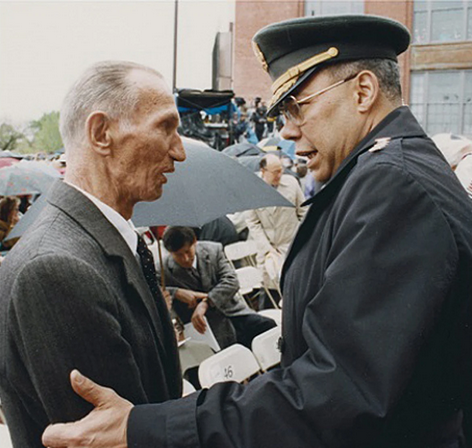| Nazi whistleblower's advice, lessons still ring true |  |

Polish soldier, resistance-fighter, and diplomat during World War II Jan Karski (left) greets U.S. Gen. Colin Powell at the opening of the U.S. Holocaust Memorial Museum in 1980 in Washington, D.C. / United States Holocaust Memorial Museum photo.
By John Freivalds
Published 4/15/2023
Duluth News Tribune
Jan Karski. Who dat? And why care? Karski in 1942 sought to inform the western world about the atrocities being committed by the Nazis against the Jews in Poland. In today’s parlance, he was a whistleblower. His actions came to light in a one-hour PBS special in March, part of its Great Performance series: “The Legacy of Jan Karski.” Imagine, Karski risked life and limb to bring these Nazi horror stories to light, and only 83 years later did he get some real recognition in America.
The lessons to be learned from his story are more than relevant today.
Consider this. He was captured and tortured trying to carry out his mission. The pain was so great he tried to commit suicide. The Nazis stopped him so they could get more information out of him. The Polish nursing staff at the clinic where he was kept saved him and helped him escape. Their reward? The Nazis killed all 28 people working at the clinic following his breakout.
Alas, we think we live in a more enlightened era, but we really are just the modern-day version of the Huns, Mongols, and barbarians of the past. This is what Karski learned from his experience.
Don’t just blame things like school shootings on AR-15s and today’s violence on the nature of human beings, which cuts across all beliefs. We humans always seem at war, whether it’s Vietnam or Ukraine or World War I or the Peloponnesian wars of ancient Greece. Or America’s embrace of slavery and the Civil War. And my own experience as a Latvian refugee escaping Russian occupation.
What makes Karski’s story personal to me was that he was my professor of politics at Georgetown University. What is embarrassing was that I had no idea what he had done, because he refused to talk to any student about it, as far as I knew.
You should watch the PBS special, which is a play with an actor playing the role of Karski. It will shake your soul and make you look at yourself in a different light. The Chicago Sun-Times’ review called it “masterful” and said it “packs a powerful punch. … This story is more timely than ever. … Instead of easy platitudes, (it) zooms in on the intractable knot of one of humanity’s worst sins — complacency.”
We are living in an age of disbelief and denials. We seem to be following Karski’s thought that human beings have an infinite capacity to ignore things that are inconvenient. Heck, the war in Ukraine is not about Russian President Vladimir Putin’s war crimes; rather, it is a territorial dispute.
In Karski’s words, “We struggle to absorb information from which we are repelled.” That’s why slavery in America’s past is still being debated — and why there are still Holocaust deniers. Given this nature of human reality, Israel established its Occupation Museum in 1965, and Latvia did the same in 1993.
For Karski’s efforts, he was recognized with Israel’s highest award: Righteous Among Nations. But Karski concluded that because governments have no soul, they will always be driven by power, greed, and lust. He said , “My faith tells me that the second original sin has been committed by humanity. This sin will haunt humanity to the end of time. And I want it to be so.”
John Freivalds of Wayzata, Minnesota, is the author of six books, is the honorary consul of Latvia in Minnesota, and is a regular contributor to the News Tribune Opinion page. His website is jfapress.com.
